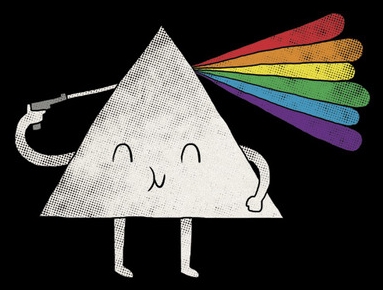So, this post is regarding the Prism program, and the phenomenon of mass-level metadata accumulation and pattern analysis that it represents. ProPublic has published an extremely useful timeline about how the United States intelligence community has developed to this point (such as we can know on the outside, given the high amount of top secret classification). Meanwhile, my colleague Joshua Foust (who has testified before Senate about over-classification and other problems in the intelligence industry — among other things, that it’s an industry), has published nine points about Prism that the public should think about. The most important are points #3, 7, and 8.
Joshua’s remarks border on the cynical, but nonetheless he is onto something. With respect to his last point, my job here is to explain about why this shouldn’t be a temporary outcry. And the explanatory methodology is simple (and I would say, spiritual). The consequences, however, are complex. (I) On the one hand, the citizen and the spy need to put themselves into each other’s shoes; and (II) on the other hand, the citizen needs to really understand what is being asked of him/her by the spy, but also why the spy shouldn’t be asking this of the citizen, either.
(I)
Being charitable and assuming that intelligence services have the best of all intentions, the most rigorous of ethical practices, etc., the inescapable fact of the matter is that we’re being asked to trust them without proof. Granted, soon the intelligence community shall present to the Senate examples of terrorist plots which they say have been thwarted by Prism and similar initiatives. The catch is that this presentation shall occur completely behind closed doors, and strictly for a select few. An elected few for sure, so at least symbollically or in principle it is “us”, the American people, who are being informed. Still, symbolism is not the same as concretism.
This is not to say that the doors of secrecy should be flung open and the entire security apparatus exposed; discretion is important in all things. Rather, it is to say that what should be truly shocking is precisely how much our intelligence services believe they don’t have to take any serious concrete steps of accountability and transparency (in the least, there exists a huge gulf between what those inside and outside the establishment consider as accountability and transparency). Moreover, it is shocking how violated their sense of entitlement appears to be when journalists demand that they throw us a bone. What happened to our intelligence services sense of themselves as servants?
I think the answer to that queqstion lies in how much they sometimes seem to expect and rely upon our apathy. In this post, I’m trying to talk about the intelligence services as real human beings. As a subculture, they think of themselves as guardians (and in a divided world rightfully so). But who are they guarding? What is the kind of society they are protecting? The craven, aimless materialism that masquerades as “liberty”; zero historical consciousness and even less appreciation for the sacrifices of our forefathers; the reduction of the democratic process to commercial spectacle; the slavishness of our elected representatives to corporate power — etc. etc. Simply put, if I were them, I might be very tempted to feel elitist, too.
(II)
At the same time, our intelligence services fail to understand that the kind of blind trust they are demanding is per definition destructive to democracy, not only epistemologically and spiritually, but practically, too. To put it simply, we on the outside of the establishment (to say nothing of the many within the establishment, too!) are unable to determine when intelligence is being abused to gain leverage over the democratic process.
Take the example of Prism itself: how do we know with relative confidence that pattern-analysis isn’t being done of certain members of Congressmen (“Hmm, why would a mobile number at a Senate office desk be texting a mobile number in a nearby university dormitory so often?”), or that it isn’t even being used to affect entire electoral campaigns (“Hmm, there are certain mobile-based purchasing habits in that district that conform to the predictions of marketing analysis for Republican Party voters…”).
I’m not saying this is happening; I’m saying it could, even despite legal protections. The temptational apple is there, ripe and ready for the picking. For example, in April 2009, the NSA said it “overcollected” domestic communications it wasn’t supposed to, due to technical error. It could be true, or it could be a convenient excuse (and there’s no reason why it couldn’t be both). And who’s to say what happened to that data before the error was “discovered” and — we hope, we believe, we trust– expunged from the system? What if it was already “innocently” incorporated into analysis at the time: should the NSA then not have used it?
That’s a question that becomes all the more complex if the “accident” did end up saving lives! Again, if I were them, I would actually want to avoid such ethical complexities as much as possible…
(Post-Script)
More and more as I develop as a Bahá’í and a journalist, I find that it’s important not to avoid controversy per se, but to avoid contention — a big difference. When thinking about this incident, my intuition was to avoid discussing the character of the whistleblower Edward Snowden, lest we end up in the very distracting debate about character that blew up around Julian Assange and rendered it impossible to have a reasonable conversation about leaking. I also felt that there needs to be a finer line walked between the Left- and the Right-wings on this issue, between those who would cast light upon everything and those who would hide everything in the dark. I learned that the tough but good way by having real conversations with colleagues on either of the issue, especially the Right-wing, pro-secrecy side (since my own instincts are toward the Left-wing, pro-transparency side).
I have too many personal connections in intelligence services to believe that the majority of them don’t have the best intentions at heart, but I have too many personal connections outside of the intelligence services to believe that the government’s projects have only benign results (or that my loved ones inside the establishment aren’t being exploited, either). Bahá’ís believe in unity, so what I’m really trying to do in this post is bring the two sides together and say: the real devil here is extremism, swinging between unchecked power and absolute exposure. We can figure this out together, but only if we try.


An interesting post, especially on the possible abuses of information. This is one of the items which has not been touched upon that often. Recently a journalist (ill try to provide the link later) wondered about financial information. for example: when an email talks for example about a plan for a corporate fusion, conflict of interest upon reading such communications in higher intelligence circles is nearly inevitable.
Secondly, a Belgian journalist posted a blog in the newspaper demorgen on how the worst threat of prism is actually not the crackdown on personal space, but one on public space. Public space as a possibility for semi-anonymous protest as “a part of the people/population” is turned into a well-divided panopticon in which every voice can be accounted for.
link: http://www.demorgen.be/dm/nl/2461/Opinie/article/detail/1651862/2013/06/14/Maak-je-geen-zorgen-om-je-privacy.dhtml